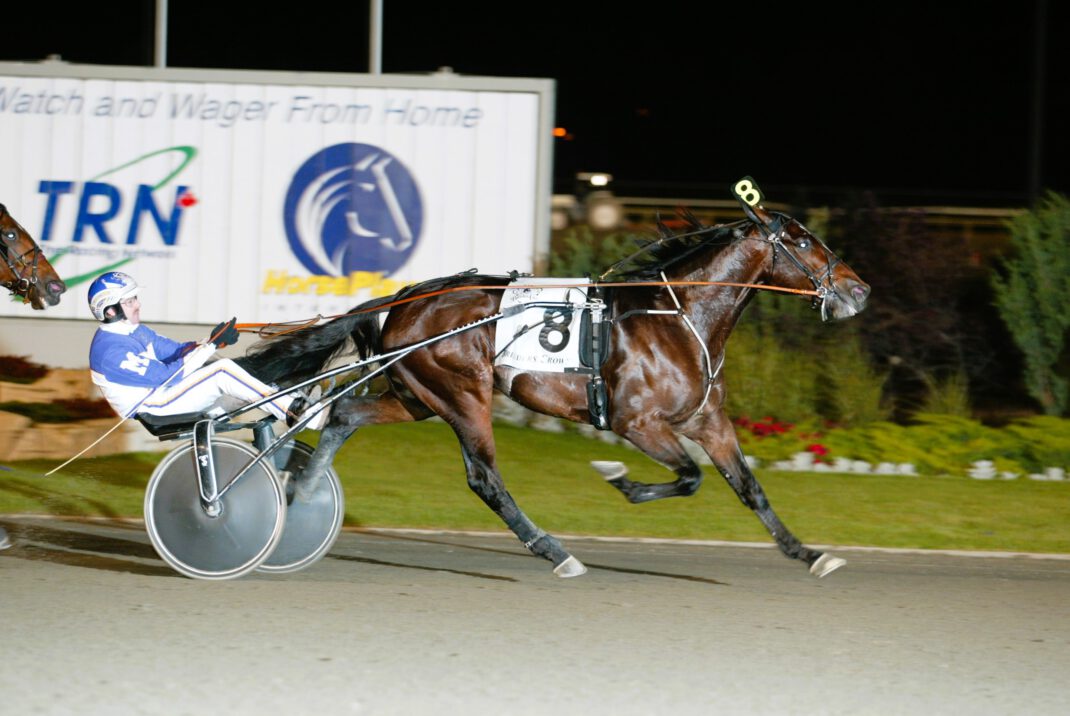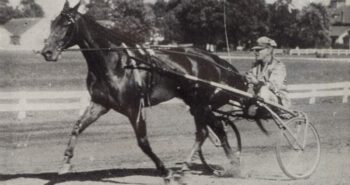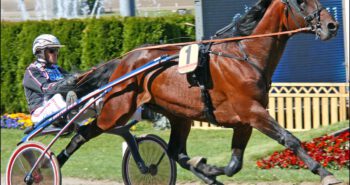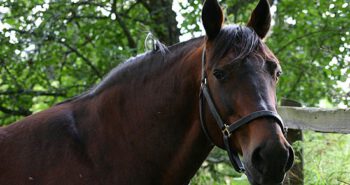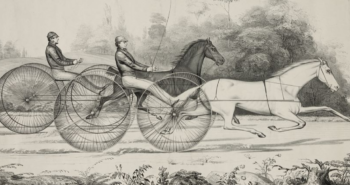Named for a Pokemon character, the Illinois-bred trotter proved that you don’t need the most fashionable pedigree to beat the best. Kadabra was a spectacular trotter who set a world record at 4 before he retired to become an elite stallion.
It is rare for the top trotter in the US not to contest any of the Triple Crown races, but in 2002 the crop-topper Kadabra wasn’t found in any of the Triple Crown races. Bred, owned and trained in Illinois by Homer and Connie Hochstetler, Kadabra started his career with two wins and a second at Balmoral Park before going up against Andover Hall in the Hanover Stake at the end of July as a two-year-old. Kadabra showed he belonged among the best by finishing second to the Garland Lobell son in 1:58 (1.13,3) – Andover Hall won in 1:57.4 (1.13,2) – and then proceeded to win 8 races in a row, including elimination and final of the Illinois State Fair, the Darn Safe Stake, the American-National, elimination and final of the Lincoln Land and the Sarah Myers Breeders Stake. He was also first in both the elimination and final of the Matron Stakes, but was stripped of the wins after a test revealed bute in his system.
A break-through horse for the Hochstetler family, the story of Kadabra starts several years prior to his birth in 1999. Five years earlier, in 1994, Beulah Dygert had bought the yearling filly Quillo, bred by Homer Miller and Dennis Yoder, for $10,000 at auction. After suffering a fall at Maywood Park, Quillo never raced, and following health complications, Dygert gifted the mare to the Hochstetler family. Her first foal was Money Minded, a colt by Wall Street Banker, in 1997. A winner of 22 races and $163,067, Quillo then proved herself a true elite broodmare when she was bred four times to the Hochstetler’s unproved stallion Primrose Lane. In addition to Kadabra, this combination also produced 1:54-trotter Lifes A Holiday, winner of 41 races and $729,125.
A big money sale
The excellent performances at 2 had not gone unnoticed and in February the following year Peter Heffering and four partners shelled out $800,000 for the 3-year-old star, who was then moved to Jimmy Takter. Though seen by many as a big gamble at the time, and some even questioning Heffering’s sanity, with the benefit of hindsight it was an excellent business decision. Kadabra wasted little time establishing his credentials at the biggest stage, even though he had shown his quality the previous year, first by comfortably winning his Stanley Dancer elimination, ahead of Ens Snapshot and Chip Chip Hooray, and then by mopping the floor with the rest of the field in the final. After the win, Takter coolly stated that Kadabra was “an amazing horse and worth more than the 800,000 dollars the owners paid for him.”
It was a meteoric rise to stardom for a horse many yearling buyers were skeptical to buy. His sire Primrose Lane was nothing special on the track and not a highly rated stallion, while his young dam Quillo, a $10,000 yearling purchase, was unstarted after a fall on asphalt at Maywood Park forced her into retirement before she had even made a single start. In fact, his pedigree was void of Valley Victory and Super Bowl, and the only Speedy Somolli-son in the pedigree was the unfashionable Trottin Happy, a stallion unknown to many at the time. Quillo, though, turned out to be a very nice broodmare and Kadabra’s two year older full brother Life’s A Holiday was himself an excellent trotter who earned more than $700,000 in his career.
There is quality in the maternal line as it descends from Nervolo Belle through her fantastic daughter Volga E but that is many generations removed. There is also quality closer to home in the excellent millionaire trotter American Lane – also a son of Primrose Lane – whose grandam Speedy Moriah is a full sister to Kadabra’s grandam Arsenals Dynasty. Quillo immediately showed her quality as a broodmare, yet nobody really expected a horse of Kadabra’s supreme quality to come out of the mating. It was the quality of Quillo that made it easier to sell Kadabra, though. While contemplating the offer, Connie’s father Doug Ackerman said that “you’ve got the factory, sell the product” referring to the Hochstetlers owning both parents. Their son Jay was understandably unhappy with the sale, however, as the horse was named for his favourite Pokemon character.
Trotter of the year
Kadabra continued his winning ways, returning to Illinois to first take home the Review Stake befire defeatung Andover Hall to win the American-National in 1:53.4 (1.10,7) at Balmoral. Traveling to DuQuoin, Kadabra was not at his best in the World Trotting Derby. He finished second in the first heat, defeating Chip Chip Hooray but narrowly losing at the wire to the fast closing Like A Prayer, and then fourth in the second heat when he faded as Andover Hall held off Like A Prayer to win by a neck. But Kadabra would never let Andover Hall get the better of him again as he returned to winning ways in emphatic fashion, winning his six remaining races at 3, the elimination and final of the Canadian Trotting Classic, Breeders Crown and Matron Stakes, respectively, with ease. In his Breeders Crown elimination Kadabra trotted the final quarter in a very fast 26 3/5 seconds (a 1.06,1 kilometer rate) and clearly underlined his credentials as the best in the crop. Instead of heading to Italy for the Premio Orsi Mangelli, the biggest race in Europe for 3-year-olds, Kadabra took a deserved break after a year which yielded his owners $1,215,496 in earnings and he was voted Trotter of the Year by the US Harness Writers Association.
While many of the top 3-year-olds are retired to stud, that was not an option in Kadabra’s case. Heffering had brought four other owners into the the Abra Kadabra Stables group, Irving Storfer’s Banjo Farms, Lee and Linda DeVisser’s L and L DeVisser LLC, Irving Liverman as well as David McDuffee. When buying into the horse, Storfer would do so only on one condition: that Kadabra race as a four and five-year-old and wouldn’t be quickly retired to stud. Of course, Storfer didn’t initially think Kadabra could ever defeat Andover Hall and assumed the colt would need several seasons to recoup his price tag. He changed opinions early in Kadabra’s three-year-season but that’s a different story…
Kadabra only competed at the Meadowlands at 4 and after a slow start, where he twice finished third in insignificant overnighters, he took home the Arthur Cutler Memorial in 1:53.4 (1.10,7). After a sixth-place finish in another overnighter he then won the Titan Cup in 1:52.3 (1.10,0) and then set a lifetime mark of 1:51.3 (1.09,4) in another overnight race on July 11, 2003. After his Cutler win Takter stated that “I would like to take him to Europe next year to win the Elitlopp and Prix d’Amerique like Moni Maker did” but unfortunately it was not to be. After finishing a disappointing seventh in the Nat Ray, won by Rotation ahead of HP Paque, they found a suspensory ligament injury in his right hind leg. This forced Kadabra into retirement, and for his complete stallion career he he stood stud at Heffering’s Tara Hills Farm in Ontario. Kadabra passed away there in late March 2021.
A dominant stallion
Just two months prior, Kadabra had been retired from stud duty. In a press release, Tara Hills released a press release containing a quote from David Heffering: “It is with great sadness that we announce Kadabra’s retirement from stud duty. Kadabra leaves a great legacy and influence on the Standardbred breed, not only in Ontario, but industry wide. Over the course of a 17 year stallion career, Kadabra has cemented his place as one of the all time great trotting stallions with progeny earnings of over $101 million. Champion fillies and colts included Bee A Magician, Emoticon Hanover, Daylon Magician, Flanagan Memory, Caprice Hill, Forbidden Trade, Poof She’s Gone, Will Take Charge, and many more. It has been a great honour for us to have cared for and managed Kadabra throughout his stallion career. Thank you for your support over the years.”
At stud, Kadabra had indeed proved an excellent stallion and sired numerous stars such as Hambletonian-winner Forbidden Trade, Bee A Magician, Daylon Magician, Flanagan Memory, Caprice Hill, Poof She’s Gone, Emotion Hanover and Prestidigitator in North America, as well as European stars such as Support Justice (four European group 1 wins including the European Championship for 5-year-olds), Stand and Deliver (winner of the Danish Derby), Mystical Ann (winner E3) and the Finnish duo Benjamin Evo and Harmi’s Frido. He’s also the damsire of Hambletonian-winner Perfect Spirit.
Kadabra was inducted into the Canadian Trotting Hall of Fame in 2012.
Kadabra
Bay colt born in Trivoli, IL on May 10, 1999. Died at Tara Hills Farm in Canada on Mar 27, 2021.
Primrose Hill – Quillo (Trotting Happy)
36 starts: 25-4-2 – 4, 1.51,3 (1.09,4) – $1,806,779
Breeder: Connie Hochstetler
Owners: Homer and Connie Hochstetler – Peter Heffering and partners – Kadabra Syndicate
Trainers: Homer Hochstetler and Jimmy Takter
Drivers: Homer Hochstetler and David Miller
Grooms: –

